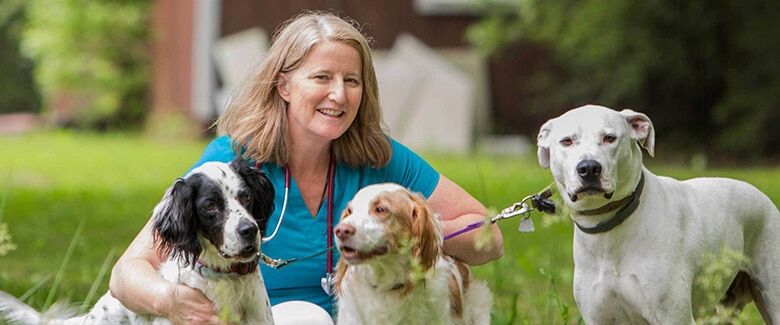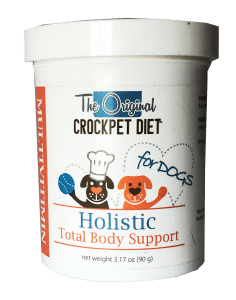When it comes to feeding our dog, it can be challenging. We try our best, but we don’t always know what makes a good diet that is nutritionally sound, providing our dogs all the necessary vitamins and minerals they need to thrive. Sometimes, we do home-cooked meals, thinking throwing in some chicken, mixed with rice and vegetables will cut it for our best friend, but I hate to break it to you; it won’t. Dog-food delivery can be expensive. Dry kibble can be more cost-effective, but in the long run, may not be that healthy. And for raw, there are people on both sides of the fence.
So, when I met Dr. Ruth Roberts, a holistic veterinarian and pet coach (yep, they exist!), I was intrigued by her obsession with providing our best friend a healthy diet. Her motto: good nutrition equates to good health.
“Paying close attention to what our pets eat, to what fuels their body, is the first step in preventative care and maintaining good health,” she writes on her website.
She made pet nutrition her passion after changing her own way of eating and seeing the impact it had on her. After, she switched up her dog’s nutrition plan, she also saw a huge difference.
While she’s now retired from veterinary medicine, she is still focused on helping dogs (okay, cats too) live a healthy, happier and longer life – something we can get on board with. She started with a home-cooked recipe for dog food called the Original Crockpet diet (available to members), and has expanded to include supplements and consultation.
Related: How The Gut Impacts Your Dog’s Breath — And What to Do About It
“I’ve supported hundreds of dogs and cats to heal and overcome health hurdles like chronic kidney disease, GI Illness, allergies, cancer and much more,” she tells us. “My experience and insider’s knowledge of the veterinary industry will save you money on your pet’s healthcare, avoiding unnecessary suffering, treatments and tests, enabling you to focus on providing the care your pet truly needs, and reduce stress all around.”

We caught up with her to talk about her passion, mission and what we can all learn about dog nutrition.
(This interview has been edited for clarity and brevity)
As someone who has a background in veterinary medicine, you could have created a number of products to address certain ailments/conditions our dogs face. What made you decide to focus on nutrition?
I’ve said many times over the years that you can’t pill your way out of a bad diet. It’s becoming clear on the human side that lifestyle choices — what we eat/don’t eat, if we move/don’t move, how we think, what we spend time with — all have an impact on health.
Currently, it’s estimated that over 600,000 new cases of cancer occur in the US every year, due to lifestyle choices. Not vaccines, not environmental toxins, not electromagnetic pollution. That is just stunning. Though the studies are not there for our pets, their health issues parallel our own — and by extrapolation, lifestyle choices have a huge impact on their health.
Highly processed foods (think: corn-based pet diets) and extremely high simple carb diets create the same health issues that we see in ourselves. Obesity, arthritis, kidney disease, liver disease, heart disease, cancer and auto-immune diseases.
You are really focused on home-cooked diets. Why is that?
I started studying Traditional Chinese Veterinary Medicine as my introduction to the alternative health world. TCVM teaches that the stomach is the cooker of the 100-degree soup, and when food is presented to the body in an easy to digest format, almost pre-digested, it can use the food so much better.
Cooked food is what dogs ate as they evolved with us, and it help make the nutrients more available for absorption in the body, especially for pets that are sick. It is true that the nutrient/enzyme/ whatever content in raw food is higher, but if your digestive system can’t access it, what good is it.
How did you come up with the recipe for the Crockpet diet?
I was very ill back in 2006, and part of how I got well was by changing my diet from highly processed foods to whole foods. It was then I realized pets were eating the same highly processed food stuffs in the average bag of food. At the same time, I was studying TCVM, and one of my own dogs had bacterial endocarditis, which is generally fatal. I consulted my teachers, and they helped me develop a basic diet to support her heart via TCVM principles. I watched a 1/2 inch heart lesion shrink down to the thickness of paper over 2-3 months, and this very ill dog return to her normal activity. I developed a general recipe for my patients, just as the first pet food recall hit. It was a smashing success and prevented many pet’s from being exposed to melamine.
I’ve adapted it over the years to include more nutrition concepts from functional medicine, phytonutrients, etc., and had a boarded veterinary nutritionist balance the diet for match the designation of “complete and balanced for all life stages, according to AAFCO standards”
So, talk about the Original CrockPet diet. What is in it?
Why did you think you needed to create this?
I was so stunned at my own experience with changing my diet, and changing my health, I knew the pet food companies weren’t looking beyond fulfilling the bare minimum nutritional requirements and thought, “What if most of the chronic disease I’m treating in my patients is actually due to malnutrition?”
We think of malnutrition as babies starving in Ethiopia. While that is sadly still true in many corners of the world, in the US, more often, we are obese due to an excess of highly processed carbs, which limits our access to health-giving nutrients found in real foods — meat, fats, veggies and healthy whole starches. It quickly became clear to me that you just can’t pill your way out of a bad diet. If we don’t repair the foundation of health, a healthy diet, we can never truly heal our pets.
There are people who don’t have time to cook food or it is too costly. This is where your Holistic Total Body Support, a vitamin supplement you created, can help. Can you talk about this product and what makes it different than other supplements?
I believe in glandular support for pets, but there was literally nothing on the market that was a complete multivitamin, and glandular support, all is one. So many products were proprietary, so you can’t be sure that the needed nutrients were there in the correct amounts.
Once clients started using Holistic Total Body Support they literally cut their supplement bill by 50-75 percent.
The other thing that was driving me batty is that so many supplements had garbage in them as fillers — maltodextrin, gums, etc. I used alfalfa, which has its own set of health benefits, as the filler.
Standard pet food is balanced for the minimum nutritional requirements, and the nutritional content is often measured prior to processing the pet food, so at best your pet is getting the bare minimum, and sometimes not even getting that.
Even if you can’t cook, or that is too overwhelming, adding Holistic Total Body Support to your dog’s food, and a handful of frozen veggies you’ve boiled up, will be amazed at the changes you see.
Related: The Complete Guide to Making Home-Cooked Dog Food
Besides providing a healthy diet for dog owners, you are also providing a unique point of view for owners through your consultation services, offering up advice that may be different than our regular vet we see. Why do you think it is important to provide this take on pet health care?
I take an integrative medicine approach. This means I combine conventional veterinary medicine, TCVM, functional medicine, food therapy, nutritional supplementation and anything else I can think of, I adapt current research from the human medical field to help pets and owners sort through what is or is not working, and what their health goals are.
Too often, conventional veterinarians shove “the standard of care” down pet owner’s throats without thinking to ask, “Does this actually help or improve the quality of life for this individual animal?” Is this something this pet owner can live with?
Look at low-dose aspirin. Everyone believed it helped prevent stroke and heart attacks. They finally did a study to see if that was true, and it turns out that it has no effect whatsoever. It is so much worse on the veterinary side — research is often paid for by the drug companies. We actually know so little, scientifically speaking about what helps chronic disease in pets. I offer solutions that I’ve seen be effective in hundreds of pets, and have the humility to know when it’s time to try something else, or look for other help.
Related: Can’t Afford Your Vet Bills? Here Are Some Financial Aid Services For You.




















